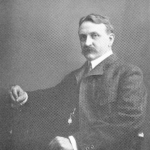Background
James Allen Smith was born on March 5, 1860, in Pleasant Hill, Missouri. He was the son of Isaac James Smith, a sea captain-turned-farmer, and Naomi (Holloway) Smith.

111 Jesse Hall, Columbia, MO 65211
J. Allen Smith studied at the University of Missouri in Columbia. In 1887, he received a Bachelor of Laws degree.
500 S. State Street, Ann Arbor, MI 48109 USA
Smith received a Ph.D. from the University of Michigan in 1894.
economist educator lawyer author
James Allen Smith was born on March 5, 1860, in Pleasant Hill, Missouri. He was the son of Isaac James Smith, a sea captain-turned-farmer, and Naomi (Holloway) Smith.
J. Allen Smith studied at the University of Missouri in Columbia. In 1887, he received a Bachelor of Laws. He also received a Ph.D. from the University of Michigan in 1894.
Following his graduation from the University of Missouri in 1887, Smith worked as a lawyer for several years. Dissatisfied with the profession, he enrolled at the University of Michigan, where he worked under the economist Henry Carter Adams, noted for the fact that he defended labor unions, supported protective legislation for women and children, and favored a positive role for government ‘to maintain the beneficent results of competitive action while guarding society against the evil consequences of unrestrained competition.’
Smith’s career as a professor involved strained relations between himself and the governing bodies at various universities. He was appointed a professor of economics and sociology at Marietta College in 1895 but was asked to leave in 1897 because the college’s trustees objected to his politics. Smith was also dogged by problems due to his radical ideas at his next appointment, the University of Washington.
Smith wrote "The Spirit of Government," which appeared in the Citizen's Library in 1907. In 1912 he wrote the book The Spirit of American Government - A Study of the Constitution: Its Origin, Influence and Relation to Democracy.
James Allen Smith is most commonly known as an influential spokesman for progressive constitutional thought. His most important book was The Spirit of American Government (1901), subtitled "A Study of the Constitution: Its Origins, Influence and Relation to Democracy," where the author explains his thoughts about the political situation.
(A Study Of The Constitution: Its Origin, Influence And Re...)
1907As a child, Smith’s “pro-Confederate” family was, in 1863, “forced to leave their farm by a military order expelling the settlers from the area to deny local assistance to pro-Confederate guerrillas. Smith’s mother held a "bitterness over the Union victory which reinforced her tendency to romanticize the gentility of the antebellum Southern way of life." This home atmosphere left its mark. Smith retained Southern attitudes about the Negro’s place; he favored restrictions on the entry of Orientals and the new immigrants from southern and eastern Europe; he felt uncomfortable in personal contacts with workingmen. And the legacy of allegiance to the Lost Cause contributed to his sense of alienation from the main currents of post-Civil War America.
Smith contended that the Constitution represented a reactionary and undemocratic retreat from the revolutionary principles of the declaration of independence. He proposed to make the Constitution more democratic by eliminating checks and balances, curbing the supreme court, and introducing direct elections for the President and senate along with referendum, and recall.
Complaints about Smith’s radicalism were given new force with the publication in 1907 of The Spirit of American Government. In the preface, Smith boldly laid out his thesis: that ‘the real spirit and purpose’ of the Constitution was ‘its inherent opposition to democracy.’ His own purpose in writing the book, he explained, was to strengthen and advance the cause of popular government by bringing people to a realization of the fact that the so-called evils of democracy are very largely the natural results of those constitutional checks on popular rule which people have inherited from the political system of the eighteenth century. Although Smith’s book was rejected by a good many academics, it was a critical and popular success.
On November 26, 1890, Smith married Doris J. Lehmann. They had two children - Elfreda and Allen, who died in infancy.

December 31, 1851 – August 11, 1921
Henry Carter Adams was a U.S. economist and Professor of Political Economy and Finance at the University of Michigan
